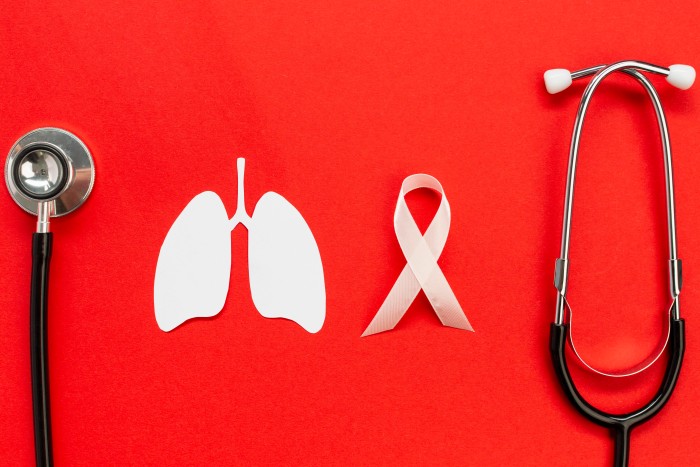IMANA NEWS
Everything About Lung Cancer Awareness Month
18 November 2025
 November is Lung Cancer Awareness Month. This month is regarded as a time to learn, reflect, and support those affected by this disease.
November is Lung Cancer Awareness Month. This month is regarded as a time to learn, reflect, and support those affected by this disease.
Lung cancer remains the leading cause of cancer deaths worldwide. It accounts for about 1.8 million deaths each year.
However, there are many who remain unaware of the biggest risks or even symptoms to watch out for.
In this article, we explore what lung cancer is and how lifestyle and environmental factors play a role.
We also delve into how IMANA helps bring awareness and support to communities during Lung Cancer Awareness Month.
What is Lung Cancer?
Lung cancer is a disease where abnormal cells grow inside the lungs.
Instead of dying off like normal cells, these cells multiply and form tumors. Over time, they can spread to other parts of the body. This makes early detection quite essential.
There are two main types of lung cancer:
1. Non-small cell lung cancer (NSCLC)
This is the most common type of lung cancer. It makes up about 85%. It grows more slowly than other forms.
When caught early, it can often be treated with surgery, radiation, or medication.
2. Small cell lung cancer (SCLC)
This form is less common but grows and spreads faster. It usually responds well to chemotherapy, especially when diagnosed early.
However, it has a higher chance of coming back.
Who is at Risk? Main Factors:
Anyone can develop lung cancer. However, the factors below can increase the risk of you developing it.
Tobacco use
Smoking is the biggest risk factor. It causes around 80-90% of lung cancer cases.
Each time you inhale cigarette smoke, thousands of chemicals enter your lungs. Many of these substances damage the cells that line your airways.
Over time, the body struggles to repair this damage, and this increases the chance that cells may begin to grow in an uncontrolled way.
The risk rises with the number of cigarettes you smoke and the length of time you have smoked. Even just a few cigarettes a day can raise your chances of developing lung cancer.
Being around secondhand smoke can raise risk too, especially for children, older adults, and people with asthma or other breathing issues.
The important thing to remember is that stopping at any stage helps. Once you say no to tobacco, your lungs begin healing. The risk never drops to zero, but it does go down over time.
Many people notice improvements in breathing, energy, and overall health within weeks or months of quitting.
Environmental exposure
Certain workplaces and living conditions can increase the chance of lung cancer.
Examples include:
- Radon gas exposure in homes or buildings
- Air pollution
- Exposure to asbestos, arsenic, or diesel exhaust
Being mindful of your environment and ensuring proper ventilation or testing where necessary can reduce these risks.
Family history and genetics
Some people inherit genes that make them more likely to develop lung cancer. If a parent or sibling has had it, your risk may be higher.
Past lung diseases
Chronic lung conditions like COPD or tuberculosis can scar lung tissue. This may slightly increase the likelihood of cancer later in life.
Watching for Lung Cancer Symptoms
Lung cancer often does not show symptoms early on. That is why awareness and screening are so important.
Still, there are signs to look for:
- A cough that does not go away
- Chest pain
- Shortness of breath
- Coughing up blood
- Unexplained weight loss
- Fatigue that does not improve
- Persistent wheezing or hoarseness
If you notice these symptoms for more than a few weeks, talk to a healthcare provider.
The importance of screening
Screening helps find lung cancer early, often before symptoms appear.
This is vital as people diagnosed early have a much higher survival rate than those diagnosed later.
Screening is recommended if you:
- Are between 50 and 80 years old
- Have a history of heavy smoking
- Currently smoke or quit within the last 15 years
If you think you may benefit from screening, start with a simple conversation with your doctor. If you are unsure whether you qualify, ask. It is always better to check than to wait.
Can Lung Cancer Be Prevented?
Not all cases can be prevented.
However, you can lower your risk with these simple steps:
- Avoid smoking and secondhand smoke
- Get your home tested for radon if you live in a high-risk area
- Eat a balanced diet rich in fruits and vegetables
- Stay physically active
- Protect yourself from workplace chemicals when possible
- Speak to your doctor if you have a strong family history
Healthy habits do not guarantee you will never face lung cancer. But they do give your body the best chance to defend itself.
What IMANA Does for Lung Cancer Awareness Month
At IMANA, caring for community health goes beyond treatment.
It begins with awareness, access, and compassion.
We believe everyone should have the knowledge and support they need to protect their health and seek care early, especially for conditions like lung cancer, where early detection can save lives.
Through our outreach efforts, education programs, and partnerships, we help families understand risk factors, recognize symptoms, and learn about screening options.
We also work to connect individuals with trusted medical resources, so taking the next step feels less overwhelming and more supported.
If you would like to support this mission, there are many ways to get involved. You can volunteer your time, share our resources within your community, or contribute to help expand our programs.